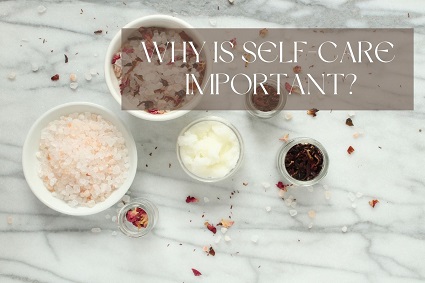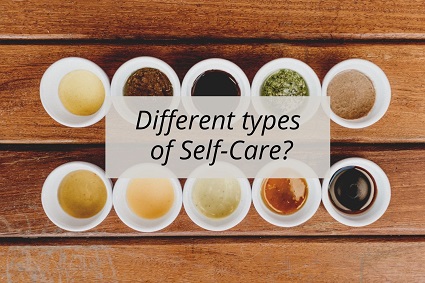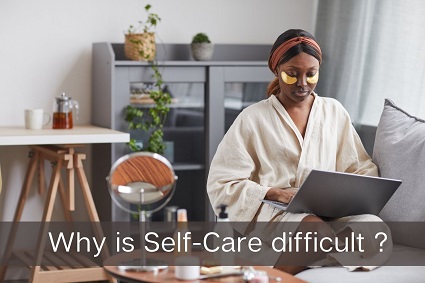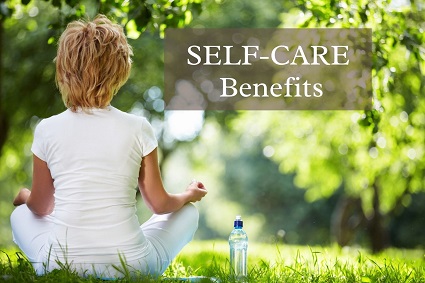What is Self-Care?
[Related Questions: What do we mean by self-care? How do you define self-care?]
The term “Self-care” originated in the medical realm, referring to patient-conducted activities that affect physical health— such as diet, exercise, hygiene, and complying with medical treatment.
 The meaning of Self-Care has expanded to include activities that influence a person’s spiritual, emotional, social, mental, and economic realms. A Self-care plan is not an ambitious self-improvement project, but a compassionately selected set of actions that bring you joy, peace and satisfaction. Personally directed Self-Care means deliberately choosing activities that create the life experience you intend.
The meaning of Self-Care has expanded to include activities that influence a person’s spiritual, emotional, social, mental, and economic realms. A Self-care plan is not an ambitious self-improvement project, but a compassionately selected set of actions that bring you joy, peace and satisfaction. Personally directed Self-Care means deliberately choosing activities that create the life experience you intend.
Why is Self-Care Important?
[Related Questions: Why is Self-Care so important for your health? How important is practicing Self-Care? How do I practice self-care when I'm depressed?]
 Behaviors that we learned growing up often become habitual and define our comfort zone—even if they are unsatisfying and don’t have desirable outcomes. Pro-active Self-Care involves re-examination of our activities to determine what is working well for us and where we need adjustments to improve our life experience. When you don’t examine and make active decisions regarding how you spend your time and efforts, you are subject to circumstances. Proactive Self-Care involves recognizing your talents, doing things that are meaningful and spending your time productively and compassionately.
Behaviors that we learned growing up often become habitual and define our comfort zone—even if they are unsatisfying and don’t have desirable outcomes. Pro-active Self-Care involves re-examination of our activities to determine what is working well for us and where we need adjustments to improve our life experience. When you don’t examine and make active decisions regarding how you spend your time and efforts, you are subject to circumstances. Proactive Self-Care involves recognizing your talents, doing things that are meaningful and spending your time productively and compassionately.
Typical Self-Care plans include goals, a plan, a schedule, and a set of pleasant or rewarding activities that can be done daily. Even small but regular changes can lead us to an energized, joyous, productive, and fulfilling life.
What are the different types of Self-Care?
[Related Questions: What is Spiritual Self-Care? What does taking good care of yourself involve? What are your self-care activities? Are there Self-Care practices for every area of your Life? What are the different ways to practice Self-Care? What are some wellness and self care techniques?]
 We have learned quite a bit about how various behaviors affect the several dimensions of our life. Unless there is a serious physical problem that needs to be addressed, it is most useful to address your Spiritual realm first. Once you have found your life purpose and applied meaning to your actions, it become easier to prioritize and align the activities in other realms. Many spiritual practices—such as meditation— also improve your emotional, physical, and mental states.
We have learned quite a bit about how various behaviors affect the several dimensions of our life. Unless there is a serious physical problem that needs to be addressed, it is most useful to address your Spiritual realm first. Once you have found your life purpose and applied meaning to your actions, it become easier to prioritize and align the activities in other realms. Many spiritual practices—such as meditation— also improve your emotional, physical, and mental states.
| Self-Care Realm | Examples |
|---|---|
| Spiritual |
|
| Emotional |
|
| Social |
|
| Physical |
|
| Mental |
|
| Economic |
|
You are more likely do activities that are scheduled and it's easier to make habits of new behaviors if you associate them with your existing routine. For example, you can play and dance to a favorite tune each morning while your coffee brews or your eggs boil. If you intend to stop an undesirable behavior, determine ahead of time which other behaviors could replace it. For example, you can deliberately replace anxious thoughts with pleasant affirmations each time they occur, or take a brief nature walk when you are bored and head toward the kitchen.
Care for yourself as the young child you were and that you still are in spirit. Give yourself compliments and treats for doing well. Find ways to focus attention on seeing, hearing, and experiencing rather than thinking. Don’t override the enjoyable sensory experience of life with concerns about the past or future. Enjoy the physical pleasure of taking a shower rather than reviewing your concerns.
Why is Self-Care difficult?
[Related Questions: Is self-care being selfish? How does Self-Care benefit your health and well-being? Can practicing self-care help eliminate anxiety? How does self care affect mental health?]
 Self-Care quite literally means to care for yourself, to treat yourself with lovingkindness, energy, and compassion. When you have many external concerns and competing demands, you may believe that you can’t spare any of your time and energy to attend to yourself, or that it is selfish to do so. Once you focus your attention on yourself to truly identify and address your needs spiritually, physically, emotionally, mentally, socially, and economically, however, you will realize that you have time and energy for everything that is important. It doesn’t necessarily take additional activities to meet your needs in all significant areas, it may just require changes in method or approach. Self-care can directly address the causes of many anxiety and health issues
Self-Care quite literally means to care for yourself, to treat yourself with lovingkindness, energy, and compassion. When you have many external concerns and competing demands, you may believe that you can’t spare any of your time and energy to attend to yourself, or that it is selfish to do so. Once you focus your attention on yourself to truly identify and address your needs spiritually, physically, emotionally, mentally, socially, and economically, however, you will realize that you have time and energy for everything that is important. It doesn’t necessarily take additional activities to meet your needs in all significant areas, it may just require changes in method or approach. Self-care can directly address the causes of many anxiety and health issues
It is important to select activities that are pleasant or rewarding for you and to clearly visualize the outcome you are seeking. How you describe your intentions to yourself affects your motivation. Consider a goal statement such as: “I want to be fit so I should eat well and exercise.” The actual emotional dynamic of such a statement is to feel inadequate and to punish yourself. When we “want” something, it means we are reinforcing the lack of it in the present moment. If the change is something we “should” do, we experience it as unpleasant, not rewarding. The goal may be launched with enthusiasm, but it depends on will power for success. When you get tired or less motivated, you are likely to return to your default behaviors. Consider the alternative dynamic in affirmations such as “I feel satisfied and healthy when I eat well,” and “I feel energized and able to focus after a brisk walk.” The affirmation recognizes your inner capacity for appropriate action and envisions the positive life experience that is to be realized.
Another important feature of Self-Care is finding ways to focus attention on seeing, hearing, and feeling rather than thinking. Don’t override the enjoyable sensory experience of life with concerns about the past or future.
What are the benefits of practicing Self-Care?
[Related Questions: How does Self-Care benefit your health and well-being? Can practicing self-care help eliminate anxiety? How does self care affect mental health?]
 Self-care simply means systematically identifying and doing what you need to experience the life you intend to live. Spiritually meaningful Self Care will enable you to experience:
Self-care simply means systematically identifying and doing what you need to experience the life you intend to live. Spiritually meaningful Self Care will enable you to experience:
You can develop a self-care plan on your own by creating a chart with the different realms and identifying the life experience you want in each realm and identifying actions you can take to realize that experience. This may involve becoming acquainted with various spiritual or healing practices, such as meditation or reiki, or just identifying activities, such as nature walks, dance or painting that can bring more enjoyment to your life.
A spiritual guide or life coach (available on this Find Magic People site) can help you connect with your life purpose and address issues in other realms. Take advantage of spiritual experiences and offerings, talk with other seekers and practitioners to become familiar with the many options available.
Established spiritual programs, such as Avatar courses, take you through experiential exercises that enable you to create a self-care plan in several realms, with support of Avatar masters. To see some examples of a few Avatar self-care activities, attend a free online workshop on Ten Actions you can do today.